Welcome to another edition of Long Live the ABB: Conversation from the Crossroads of Southern Music, History, and Culture. I want to focus this week’s conversation on one of my favorite subjects: Research Rabbit Holes.
Where does an idea come from?
In this case, it all started with a video interview from 1982 (I believe) of Gregg Allman that the Youtube algorithm gave me. At the tail end of a pretty decent talk,1 the interviewer asks Gregg about a concert the ABB played in my hometown of Stuart, Florida, earlier that year.
On January 9, 1982, the Allman Brothers Band played a show in a field in Palm City. It was to benefit David Harrison, a teen-aged motorcross champion who’d become paralyzed diving headfirst into a shallow lake. Friends and family rallied to raise money. Harrison’s best friend’s father, a longtime friend of Dickey’s, called upon his help. A backyard barbecue turned into a full-blown extravaganza when the Allman Brothers Band agreed to waive their fee for the show.
I was not aware of the show when it happened (I turned 11 five weeks later), but it was a big deal in little ol’ Martin County, Florida. Hastily put together, it drew 30,000 people to a county of less than 70,000 residents. Traffic was backed up for miles; shortly afterwards, the sheriff’s department announced they’d never again allow an event like this in Martin County.
The benefit should’ve raised considerable funds for the Harrison family, but poor cash management plagued the event. The local district attorney opened an investigation within a week. By the following January, they dropped the case altogether, unable to track the cashflow.2
I’ll say more about this in the coming weeks, but here are some quick takeaways:
I’m reminded of the Allman Brothers Band’s generosity. They played benefits from their earliest years (more on that below).
They were still earning $25,000 a show, which sounds high considering the band was about to break up, but I have no sense of comparison.3
This concert happened a week before the 1/16/82 Gainesville show that’s long circulated.
My dad described this event as a “disaster” and after reading a year’s worth of newspaper accounts, I understand why. It was also *super* cool to be reading the same news sources as Pops.
What happened once I started reading about this show in my hometown?
First things first, it cost money to access the articles that came up when I searched “David Harrison+Allman Brothers.” I’m usually a master at getting around paywalls—often deciding what I needed at that money wasn’t worth the money.
This time was different.
I was genuinely curious about the story of the benefit and paid for a newspapers.com account.4 That’s when I fell down the rabbit hole.
It wasn’t enough that I was reading my hometown newspaper, I just realized I had never accessed this database of information.
I looked up various combinations of “Allman Brothers” “Allman Joys” and “Duane and Gregg Allman” (spelled multiple ways) for the years 1965-1972 and 1982.
It came back with more than 6,300 records, which I’ve spent most of the week sorting through and collating into 600+ separate PDF files. It’s been a fun, challenging exercise.
Sharing is caring
At first I was appalled, all of this INCREDIBLE information I had at my fingertips for Play All Night that I’d overlooked!
Then I remembered y’all. Well actually, I remembered I could make sense of and share it here and some of y’all would appreciate it.
I’ll start with one of my favorites, from a 3/19/70 Macon News feature on the Allman Brothers Band.
A cropped version of their earliest press photo accompanied the article.
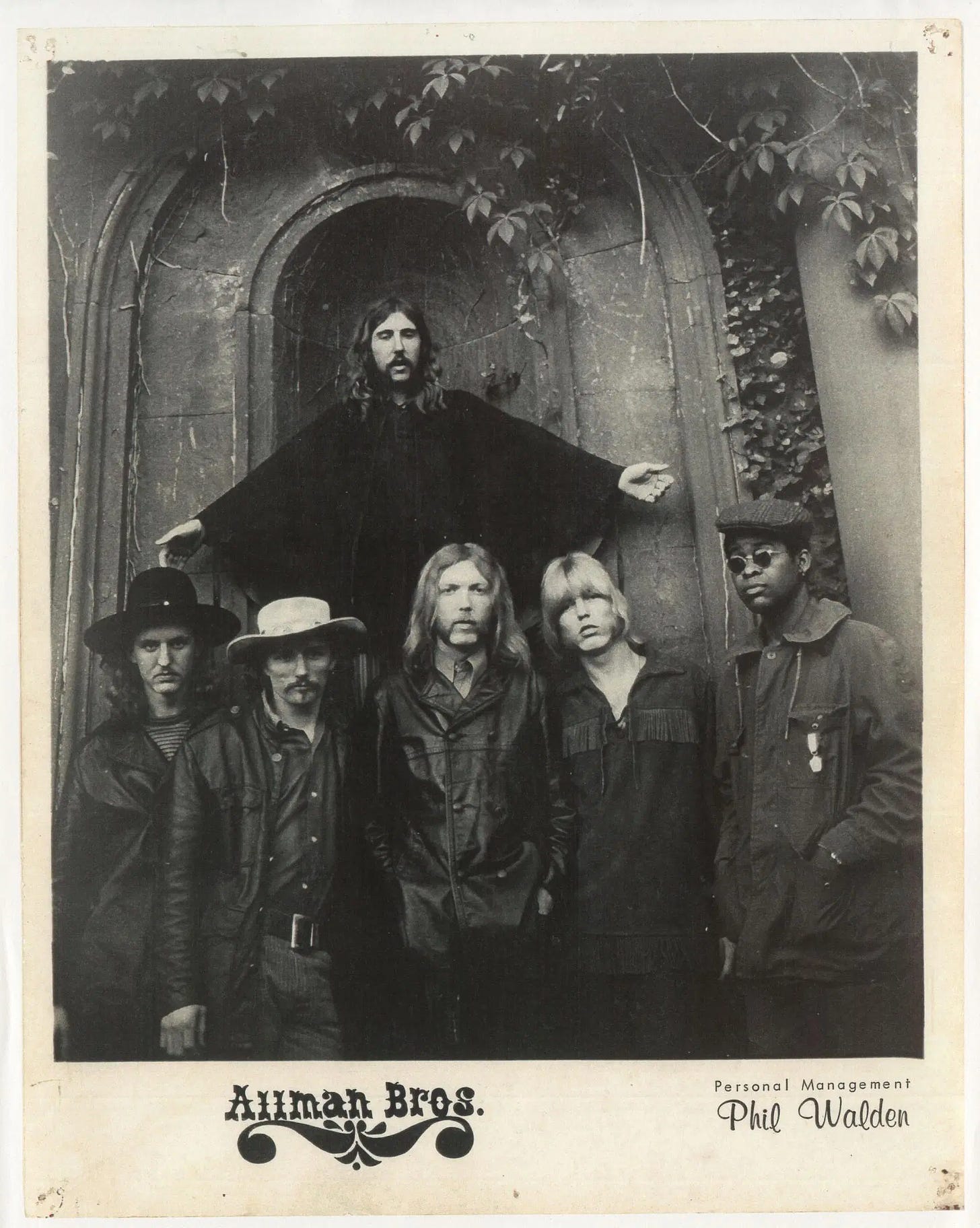
Dave Whitaker quotes Duane about the band’s earliest days:
“When we started we were pretty wide apart. It was like pouring six different chemicals together and expecting them to mix. The hand is progressing. We go more together, musically speaking, all the time. Within the next year I think we're really going to be together.”
At first glance, I find it interesting that Duane acknowledged any gap in the original group’s coalescing. But in reading it again, methinks he’s just acknowledging the group’s growth over its first year.
Duane acknowledged “a noticeable change in outside influence on the Allman Brothers.” At first “each member of the group was influenced by different artists. Now, each is influenced by the artists of the other members.”
“We listen to everybody. When you first start you listen to Bo Diddley, Chuck Berry, anybody who can really play. None of us think we're a virtuoso. We know there are a lot of people on this earth who can really do it with their own instrument. We listen to anybody who's really playing music. You can tell if somebody's chucking it.”
And once again, the ABB eschew labels.
“Neither Allman nor bassist Berry Oakley would tag a definite label on the product which has become the Allman sound,” Dave Whitaker wrote.
“We try to get it as truthful as we can within the context we're playing in,” offered Duane. “It's hard to label it because we change our minds almost every day,” adds Oakley.
The group would begin recording At Fillmore East 51 weeks to the day after this article ran. A whole lot would change in the coming years, some of which I covered in Play All Night and all of which Alan Paul
covered in Brothers and Sisters.How news traveled
This was an interesting ride for me. I culled through more than 6000 references, and only 10% of them made the final cut of sources I wanted to save.
Mentions of the ABB picked up steadily through the years: 50 (1969), 603 (1970), 1271 (1971), 2038 (1972). Items showed up in batches. In the early years, the band’s mention were mostly shows in a newspaper’s weekly events calendar, though I found an occasional review I’d not yet seen.
In 1970, the most mentions (by far) of the Allman Brothers Band concerned Duane’s appearance as a sideman, first with Delaney and Bonnie and later on Clapton’s/Derek and the Dominos’ Layla.
The band’s breakout year was 1971.
This was the year At Fillmore East broke, but it wasn’t until the latter part of the year that it was all over the papers.
Here are the big trends I noticed:
Newport Jazz Festival (March and July)
ABB’s arrest (March)
Fillmore East closing (April-June)
At Fillmore East release (July-end of the year)
March 1. The Allman Brothers’ first big media mention was the result of a March 1971 press release announcing the band’s appearance at the 1971 Newport Jazz Festival. Papers from across the country picked up the news of the lineup announcement. It was a big deal, not only because the ABB weren’t necessarily a jazz band, but also because they were completely unknown. At Fillmore East hadn’t even been recorded yet.
March 22 began a flurry of AP- and UPI-sourced stories in newspapers nationwide about band’s infamous arrest for drugs in Jackson, Alabama. This was also a big deal, but for different reasons than the prestigious billing at Newport Jazz.
April/May/June. The Allman Brothers Band got lots of press for closing down Bill Graham’s Fillmore East. This was another really big coup for the ABB—who at that point were still solidly part of the rock underground, still a month out from At Fillmore East’s release.
July 2. A bevy of articles appeared about the cancellation of the ABB’s July 2 appearance at Newport Jazz Festival due to gate crashers.
July-August. At Fillmore East spurred a number of reviews, and the ABB’s records are prominent in advertisements.
September. Twiggs Lyndon’s acquittal for murder, basically “not guilty by reason of insanity,” hit the wire services, probably because of its sensational nature.5
October 29. Just as the Allman Brothers Band were on the precipice of stardom, Duane was killed in a motorcycle accident. His death hit all three wire services: AP, UPI, and Reuters and ran pretty regularly throughout the rest of the year.
This is really just the tip of the iceberg. I took only a quick look at the material I found. I did my best to organize it into categories now. It helps that I have a database I’ve been cultivating for years for Play All Night. Right now everything’s in folders on my Google drive. Stay tuned.
Random Notes
The ABB were generous. Remember that all of this started with me researching a benefit gig in my hometown? I came across multiple causes the ABB supported including: a Jacksonville, FL, woman in need of a kidney transplant; a Venice, FL teen center; schools; and even buying televisions for Bibb County Jail inmates. By 1973 the band, at Dickey’s behest, would found its own nonprofit, the North American Indian Foundation.
1972 was an even bigger year than 1971.
The band embarked on a mammoth 90-date tour as a quintet. (I’m a big fan of the 5-man band.) Musically, they were pretty top-notch from my listening.6
Their ABBville concept—a 400 acre compound outside of town—got a good bit of coverage.
New to me were rumors of a breakup after they cancelled some shows in August due to exhaustion. (More to come.)
Berry’s death on 11/11/72 started another flurry of media activity. First for the tragic death, then the announcement they were continuing.7
Death. A general theme of the dangers of rock & roll permeated. Not just with Duane and Berry either. Clapton talked about it in the Layla interviews and several pieces cited how rock music was on the edge.
Other Allmans in the news. In the “perhaps interesting only to me department,” I found repeated references to the Allman Brothers—insurance brokers in Elkins Park, PA, Duane Allman—a Seymour, PA high school athlete, and Greg (one “g”) Allman—for the science fair and Boy Scouts in Munger, IN.
Don’t forget to follow me on the socials: YouTube / Instagram / Facebook / Threads / And, of course, Notes (you are on Notes, right?).
Langiappes
Title of today’s post inspired by a groovy video Jefferson Airplane posted on Instagram:
My current jam is Will Johnson with (his new band) Jason Isbell and the 400 Unit on Will’s “Just to Know that You Are Dreaming” from the Ryman 10/21/23.
I really enjoyed this interview of Butch and Dickey from the Capitol Theatre, the wee hours of 12/17/81, less than a month right before the Harrison benefit concert in Stuart and 2 months before the band’s second breakup.
Thanks for being here y’all.
My standard for a good interview being what I consider engaging questions that spark the interviewee in conversation. This fits the bill.
A former Boy Scout leader of mine led the investigation for the DA.
I did learn the ABB are the 137th top grossing artist of the Pollstar era (1980-2022) at $181m. For comparison, the Stones are #1 at $2.1b, the Dead at #77, $333m.
My most recent paid subscribers spurred me to make this a part of my research toolkit. Thank you.
The Buffalo Evening News, where Lyndon was tried, headlined their article, “Band Manager Ruled Insane, Cleared in Slaying.” The Orlando Sentinel ran with “Drug Using Killer Sent to Asylum.” (I know from my time working in history in Orlando that the Sentinel’s longtime editor was not a fan of the counterculture.)
It’s important to note that this came at great personal cost to the band and their families. It probably cost Berry Oakley his life.
Chuck’s official announcement hit the Macon newspaper the day Berry was killed. Lamar didn’t appear in anything until a Robert Christgau column in December.

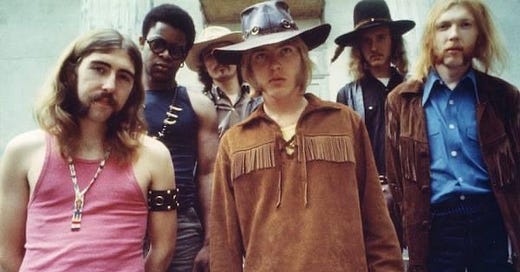





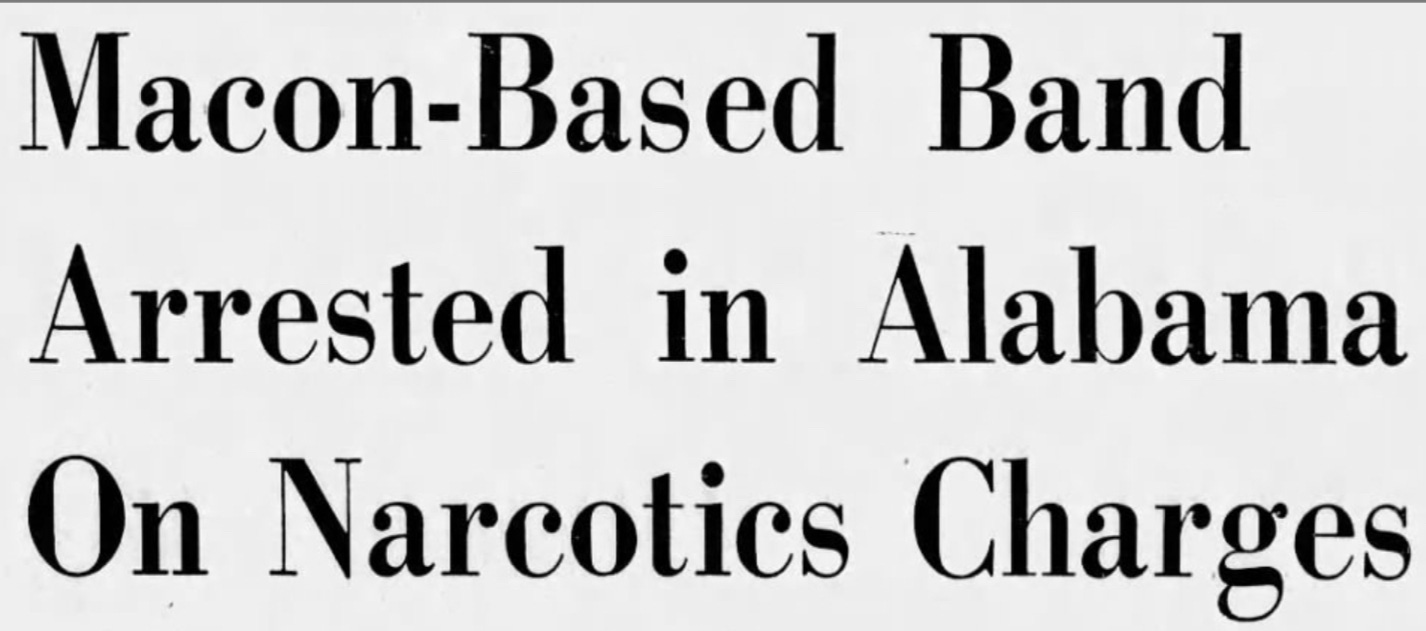
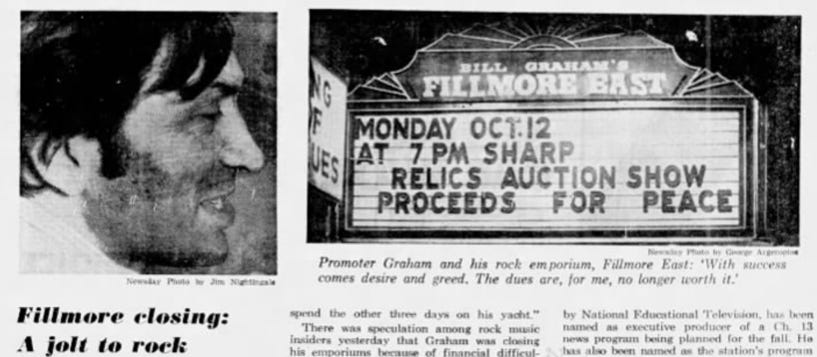
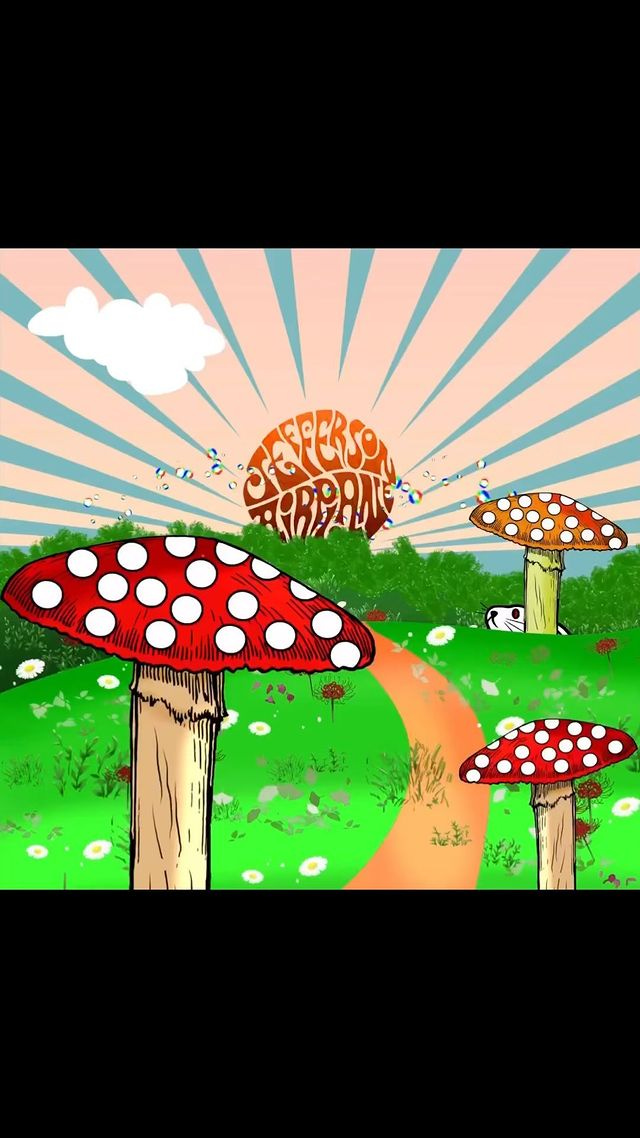
Well, welcome to the world of newspaper archives (which is also the name of a Database). I've found tons of stuff there and you've probably seen what I;ve posted online and maybe directly to you (?) over the years. I'm sure there's more out there too!
Re; Will Johnson. You might find this hard to believe but we were in a short lived band together about 30 years ago in Denton, Tx. We're still in contact here and there. If you haven;t gone down his rabbit hole, I highly encourage you do! Amazing songwriter and performer. Why he isn't more famous is a mystery to me but is definitely successful artistically and I bet he's ok with that.
-Chuck
Is it possible to purchase Play all night in a hardcover book?